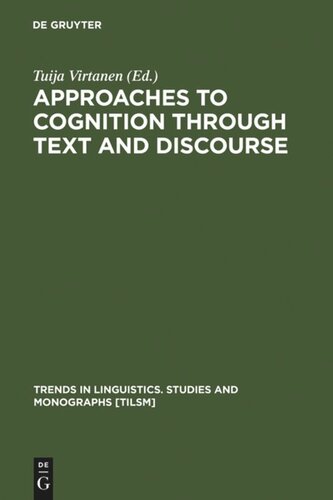

Most ebook files are in PDF format, so you can easily read them using various software such as Foxit Reader or directly on the Google Chrome browser.
Some ebook files are released by publishers in other formats such as .awz, .mobi, .epub, .fb2, etc. You may need to install specific software to read these formats on mobile/PC, such as Calibre.
Please read the tutorial at this link: https://ebookbell.com/faq
We offer FREE conversion to the popular formats you request; however, this may take some time. Therefore, right after payment, please email us, and we will try to provide the service as quickly as possible.
For some exceptional file formats or broken links (if any), please refrain from opening any disputes. Instead, email us first, and we will try to assist within a maximum of 6 hours.
EbookBell Team

4.7
106 reviewsThe purpose of this book is to explore the overlapping area of study that discourse linguists and cognitive linguists are interested in. In doing so, the volume contributes to bridging the gap between these two large groups of linguists who share an interest in discourse processing but approach the area from very different perspectives and frames of reference.
The starting point of this volume is text and discourse. The book includes an overview section and a number of carefully selected contributions which highlight central issues in the study of text and discourse attempting to give them cognitive explanations. In responding to the current interest in the area of discourse and cognition, the volume has adopted a wide scope which allows its individual chapters to focus on textual and situational contexts as well as the context of culture and society at large. The volume also provides its readership with a useful selection of methods used in the studies which form the basis of its chapters. The contributions, all by established linguists with highest qualifications, present new findings which have important theoretical implications. They offer unique and fresh analyses of central discourse phenomena in cognitive light and revealing discussions of the avenues opened to us at this stage of the development of the study of discourse and cognition.
This accessible research volume will be essential reading for scholars and advanced students of linguistics and languages.